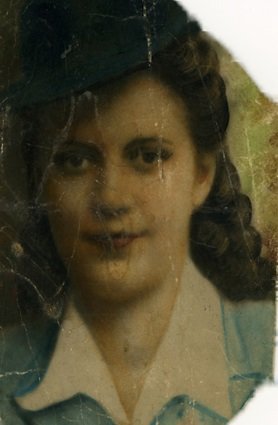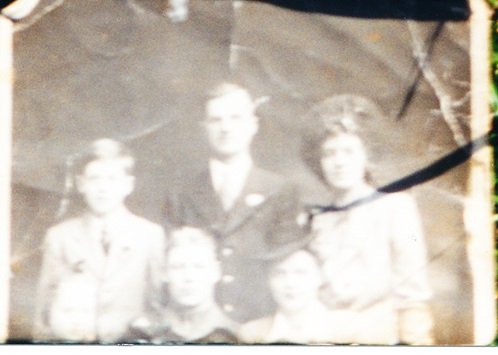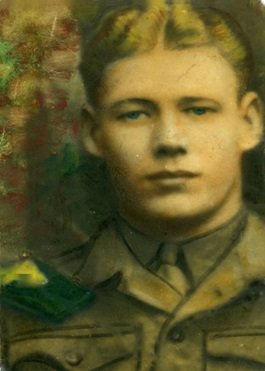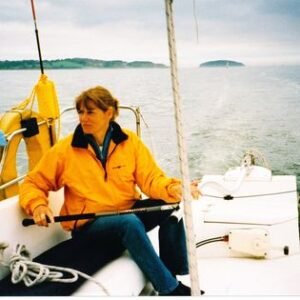


1945 was the year that Mum and Dad met and married. In January of that year, the Country was still at War on all fronts, and had a coalition government. By December it had peace and a newly installed Labour Government.
Dad recalls very clearly how they met. He had enlisted in the Army and was sent to Wrexham Barracks for training. In early January he was in a pub in Wrexham with some army mates when he felt a tap on his shoulder. He saw an extremely attractive young woman with long dark hair asking him for a light. They moved to a corner seat and started chatting. She was actually in the pub with her own date but had decided to dump him when she saw Dad. She was only sixteen but looked much older. She asked Dad to walk her home and that was the beginning of a quick courtship. By October of that year they were married just before Dad was posted to Greece for two years. They had nowhere to live and moved in with Mam and Taid, where Mum remained until Dad returned from Greece two years later.
Although the war had ended by this time, Britain, like the rest of Europe was reeling from the war damage. To give a flavour of conditions at that time Mum and Dad recalled that rationing was still in force and would get worse, as American aid started to dry up. That there were shortages of most items, because most industrial production had gone into the war effort and was only just coming back to peacetime activities.
They both remembered that they could not get anywhere to live because there was a such a shortage of housing, and most people were living in fairly cramped conditions. Sharing a house with relatives was quite normal, this might well just be a woman waiting for her husband to return from ‘the Front’ to a full complement of aunts, uncles, nieces and nephews. Children sleeping two or three to a bed was not uncommon.
Mum recalled that most items were still ‘make do and mend’ so the sofa and chairs would all be pre war, the decorations (wallpaper, carpets curtains) would be likewise. Clothes tended to be slightly worn, clothes rationing was still in force.
To put the state of the Nation at this time into perspective it is worth reminding ourselves that at the start of the war in 1939, the UK IMPORTED 70% (20 Million Tons) of foodstuff each year. Britain’s population was 46 million, so Britain’s foodstuff was severely attacked by enemy forces. To deal with these extreme food shortages, the Ministry for Food introduced food rationing, clothes were also rationed.
Rationing continued after the war, pubs ran out of beer, bread was rationed from 1946 to 1948, potato rationing began in 1947. Reasons given for extending rationing after the war included the necessity of feeding the population of European areas under British control, whose economies had been devasted by the fighting. Also large numbers of men (like Dad) were still mobilised in the armed forces and needed feeding.
But, despite the hardships there was an air of optimism, the war had been won and things were going to be better. On the whole 1945 was a fairly happy year.
World events in 1945 – the year that Mum and Dad met and married
- UK – January – In Britain V1 and V2 flying bombs still fell on the country, there were severe coal shortages and 18 year old conscripts were sent down the mines
- UK – January 3rd – The allies counter attacked the Germans in the Ardennes and broke through on the 23rd
- Germany – January – Warsaw was captured by the advancing soviet army
- Budapest – February 13th – Budapest was liberated
- Crimea – At a meeting in the Crimea at Yalta , Churchill and Roosevelt conceded to Stalin a virtual free hand in eastern Europe in return for a promise of help against the Japanese
- Germany – February 13th – The German city of Dresden was ferociously bombed, 135,000 people were killed, and 11 square miles of property destroyed
- Malta – March – In Burma the allies took Mektila
- Japan – March 9th – 280 B-29 Super Fortresses bombed Tokyo
- Germany – March 23rd – The first Allied troops crossed the Rhine, at Remagen.
- UK – March 26th – Former British Prime Minister David Lloyd George died, aged 82
- UK – March 27th -The last V2, ballistic missile, landed in Britain (Kent)
- UK – March 29th – The final V1, flying bomb, of 6,000, also crashed harmlessly in the same county
- Germany – April – Buchenwald concentration camp was freed by the allied troops
- USA – April 12th – Death of US President Roosevelt: succeeded by Harry S Truman
- Germany – April 15th – The British second army reached the Concentration camp of Belsen
- UK – April 24th – The Blackout in Britain officially ended
- Germany – April 25th – American and Russian troops joined hands at Torgau on the river Elbe, splitting Germany into 2 zones
- Italy – April 28th – Mussolini and his mistress shot dead by Italian Partisans
- Germany – April 30th – Hitler and his wife killed themselves in his bunker in Berlin. Germany overrun by the Allies
- Germany – May 2nd – The Germans in Italy surrendered
- Burma – May – The Burmese capital of Rangoon was retaken by the Allies
- UK – May 8th – The war in Europe officially ended as Germany signed a capitulation VE-day was here
- USA – June – The US troops captured the island of Okinawa and thousands of the Japanese defenders committed Hara Kiri (ritual suicide)
- UK – July 5th – Voting in the British general election: Labour win by a landslide. Clement Attlee becomes Prime Minister
- Germany – July – Churchill, Stalin and Truman met at Potsdam where they considered the military implications of storming Japan in November. It was estimated that 1,500,000 British and American troops would probably die in the assault
- Japan – August 6th – On Monday a US army Air Corps Bomber dropped an atomic bomb on the Japanese city of Hiroshima causing 80,000 deaths
- Japan – August 9th – On Thursday another atomic bomb was dropped on Nagasaki causing 40,000 deaths. The second World war had ended with over 40 million deaths
- USA – August 14th – President Truman announced the unconditional surrender of Japan
- UK – August 17th – The US lend lease scheme ended and Britain was broke!
- Singapore – September – The British recovered Singapore and released 6,000 allied prisoners from the notorious Changi gaol
- France – October 15th – Pierre Laval, leader of the Vichy French, was shot by firing squad
- Geneva – October 24th – The United Nations Organisation came into being, designed to prevent future aggression
Germany – November 20th – Opening of the trials of Nazi war criminals in Nuremberg

